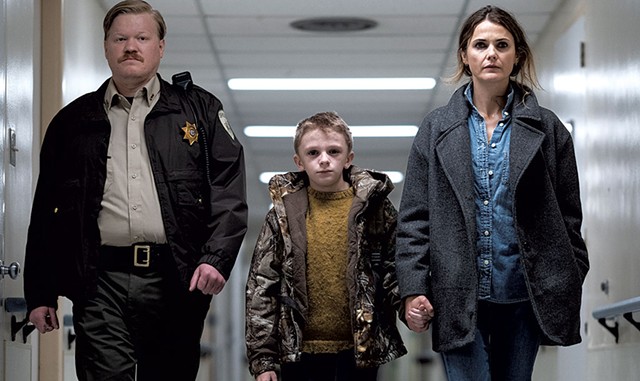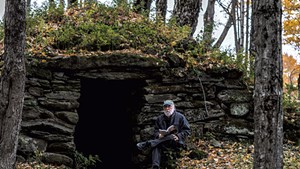
- Courtesy Of Searchlight Pictures
- UNFAIR GAME Plemons and Russell try to help a kid with a scary secret in Cooper's doggedly grim horror flick.
Could a hard enough winter make cannibals of us all? In Indigenous Algonquian folklore, the windigo or wendigo is an evil spirit that possesses people whom cold-season scarcity has driven to feast on human flesh.
This monstrous figure crops up often in pop culture, most famously in Stephen King's Pet Sematary. The 2021 horror film Antlers (on HBO Max and rentable) is a new windigo flick with a Vermont connection.
New Hampshire resident C. Henry Chaisson, who cowrote the movie with Nick Antosca and director Scott Cooper, has also optioned a novel by local folklorist Joe Citro for the screen. For a 2020 cover story on Citro, Chaisson told Seven Days' Dan Bolles that "[Citro] and I definitely compared Wendigo notes."
The deal
In a small Oregon town, something is very wrong with 12-year-old Lucas Weaver (Jeremy T. Thomas). After school, he gathers the corpses of small animals and brings them home. At night, he hides behind a triple-locked door.
Disturbed by Lucas' behavior, teacher Julia Meadows (Keri Russell) sets out to help the boy. She fears that his dad (Scott Haze), a local meth manufacturer, has become abusive toward Lucas and his younger brother.
Recently back in town after the death of her own abusive father, Julia is struggling to rebuild her relationship with her brother, Paul (Jesse Plemons), the town sheriff. She enlists him to help her protect Lucas, but neither of them is ready for what they'll find when they explore the town's dark places.
Will you like it?
For horror fans, Antlers will have few surprises. It's an elegant (and sometimes gory) variation on a familiar kind of monster flick in which the monster merely mirrors back the evil of human beings. An opening quote invites us to link the rampaging windigo to the vengeance of the despoiled Earth. The monster first appears in a disused mine, a human-made scar in the landscape that has been repurposed as a meth lab.
Despite this familiarity, Antlers has two great assets: its atmospheric setting and its young lead. Director Cooper (Hostiles) knows how to make even a gorgeous slice of British Columbia (where the film was shot) look like an industrial wasteland. Between scenic glimpses of misty mountains, he gives us scabby midcentury strip malls and sheds and attics worthy of The Texas Chain Saw Massacre. Even the humble home that Julia and the sheriff share has a significant creep factor.
Russell imbues Julia with convincing traces of lingering trauma, but it's Lucas who rivets our attention. With a Victorian orphan's complexion and piercing, dark-ringed eyes, Thomas looks like he was born to play the gifted and/or cursed children in King novels. He's also unsettlingly reminiscent of the puppet child in last year's avant-garde musical Annette — and, like her, a helpless witness to adult violence.
Antlers suggests that this violence is a repeating cycle, and no one can do much about it. Those who try to fight the evil — Julia, her colleagues, her brother — end up narrowly escaping it at best.
The windigo legend often involves agency: People invite the evil spirit into their hearts by choosing a path of ravenous greed. By contrast, no one in this story gets a choice (at least on-screen) about becoming a monster. Instead, Antlers focuses on the choice of whether to protect and nurture a monstrous loved one — an obvious metaphor for enduring abuse. Both options are grim ones, with no hopeful paths in sight.
That grimness becomes overbearing after a while. In plot, setting and characters, the film recalls one of the darker episodes of "The X-Files," without our favorite FBI agents around to provide a little levity.
Just one scene of relaxed sibling banter between Julia and her brother would have gone a long way toward making us care about these characters. Cooper doesn't give us that relief, though; the two never seem to have even the beginnings of a bond. Plemons has a talent for playing seemingly clueless bumblers with uncanny flashes of insight, but here he comes off as just clueless.
I found myself wishing the movie gave us more of veteran actor Graham Green, playing an Indigenous retired sheriff who shows up to explain the windigo lore. In his brief screen time, he offers welcome flashes of wisdom and humor that Antlers sorely needs.
If the windigo lore depicts cannibalism as a terrible choice to survive at all costs, this movie presents it as more of a foregone conclusion — perhaps even the birthright of members of a society addicted to consumption. One shudders to think what Lucas' future might be.
If you like this, try...
For Indigenous takes on the windigo, try novels such as Louise Erdrich's The Round House and Linda K. Hogan's Solar Storms.
Wendigo (2001; Pluto TV, Tubi, Shudder): Like Antlers, this psychological horror film from eco-minded director Larry Fessenden links the monster of Algonquian folklore to the offended Earth.
Pet Sematary (1989; Pluto TV, Netflix, rentable): King's gory tale of a cemetery that revives the dead is probably the best-known pop-culture version of the windigo.
Ravenous (1999; rentable): Antonia Bird's cult horror film about cannibals on the Western frontier connects windigo lore to the rapacity of the 19th-century belief in "manifest destiny."










Comments
Comments are closed.
From 2014-2020, Seven Days allowed readers to comment on all stories posted on our website. While we've appreciated the suggestions and insights, right now Seven Days is prioritizing our core mission — producing high-quality, responsible local journalism — over moderating online debates between readers.
To criticize, correct or praise our reporting, please send us a letter to the editor or send us a tip. We’ll check it out and report the results.
Online comments may return when we have better tech tools for managing them. Thanks for reading.